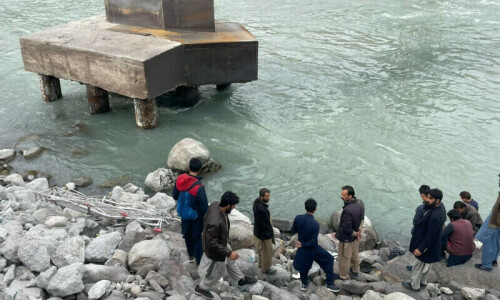ISLAMABAD: The Supreme Court has allowed the Election Commission of Pakistan to withdraw the local government elections schedules for Punjab and Sindh and announce new dates after completing prerequisites.
A three-judge SC bench headed by Chief Justice Tassaduq Hussain Jillani accepted the ECP’s request to be allowed to change the dates of LG polls after listening to Additional Attorney General Shah Khawar who had been asked by the court to assist it in the hearing of an application of the commission. The application had been filed by Advocate Akram Sheikh.
On Jan 8, the ECP had proposed the new polling dates of Feb 23 for Sindh and March 13 for Punjab.
Mr Khawar endorsed the ECP’s request, saying the contentions appeared to be plausible and even otherwise the commission under the constitution and the law was authorised to hold the elections after all the prerequisites and formalities were completed by the provinces.
He suggested that subject to the final court order the bench should allow the commission to announce fresh election schedules.
ECP Secretary Ishtiak Ahmad Khan explained the difficulties the commission was facing in holding the elections, after which the court suspended the existing schedules.
It was informed that the Sindh government’s appeal against the Dec 12 Sindh High Court order setting aside the delimitation of wards in the province would be heard on Jan 27.
But the decision will not affect the process for holding the polls in Khyber Pakhtunkhwa, Islamabad and the 43 cantonment areas.The ECP is yet to announce the date but will reportedly discuss on Wednesday a proposal to hold the polls on Feb 28.
The case will again be taken up in the first week next month.
UNCERTAINTY: The ECP recalled the schedules for Sindh and Punjab announced last month and said that the new schedules would be issued after “taking necessary steps and completion of the prerequisites”.
A senior ECP official told Dawn that the whole exercise might take about six months if a fresh delimitation exercise was to be carried out, besides the updating of the electoral laws and rules.
He said the polls would not take place on the dates proposed by the ECP during court hearing on Jan 8.
Under the rescinded schedule, the polls were to be held on Jan 18 in Sindh and Jan 30 in PunjabThe official said the Sindh and Lahore High Courts had ordered fresh delimitations — with one ordering them to be carried out by a neutral commission and the other by the ECP.
The SHC has also annulled some sections of the local government law, including one pertaining to the panel system.
The official said assigning the task to the ECP would require an amendment to the law and the clauses struck down would have to be substituted by legislation in line with the high court directives.
He said the detailed judgment of the LHC was awaited and the appeals against the SHC verdict would be heard by the apex court on Jan 27. “We will see what the Supreme Court rules and act accordingly.”
Asked about the ECP’s role if the provinces kept dragging their feet, he said both the commission and the provinces would be bound by the directives of the Supreme Court. The ECP would ask the provinces to complete the prerequisites at the earliest, he said.
According to political observers, the provincial governments do not appear to be in a mood to decentralise the powers currently being enjoyed by the members of the national and provincial assemblies.
Initially, the elections were to be held on Nov 27 last year in Sindh and Dec 7 in Punjab. The dates were extended with the permission of the apex court, while Balochistan conducted the elections on Dec 7. According to the commission, the SHC verdict as well as the Dec 31 order of the LHC made it difficult to hold the polls on the scheduled dates since the delimitation of wards in the two provinces had been set aside.
Thus the Punjab and Sindh Local Government Acts of 2013, as well as the respective rules, have to be amended by the provinces and fresh delimitation has to be carried out in the light of court orders.
CENSUS: In a related development, the National Assembly’s Standing Committee on Parliamentary Affairs unanimously called for a census before the local government elections — an idea which could delay the polls for a year or so.









































